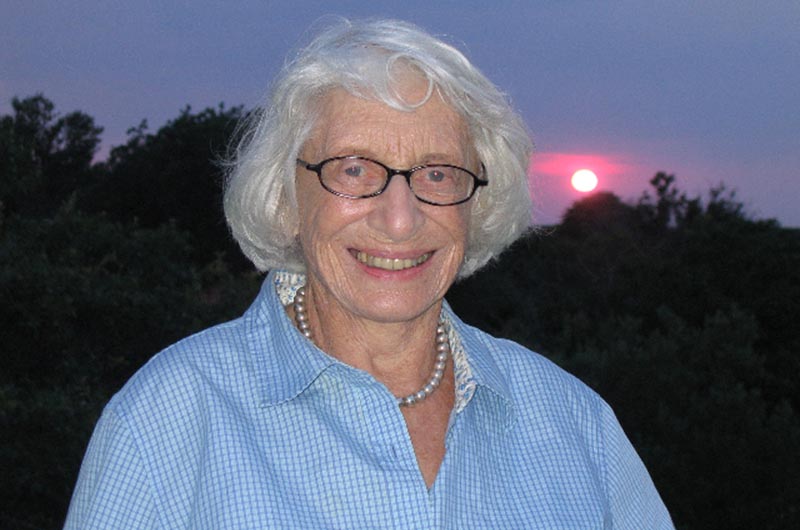Frances Mendelson Tenenbaum, an award-winning garden writer, longtime Houghton Mifflin editor and an Aquinnah seasonal resident for almost 50 years, died at her winter home in Cambridge on Tuesday at the age of 94.
Her death occurred only after a series of illnesses gradually sapped her life force and almost managed the near impossible — dulling her razor-sharp wit. Stubborn, charming, curious, acerbic, generous to a fault, Frances Tenenbaum was a writer, editor, bridge player, gardener, bird watcher and beloved mother, in-law, grandmother, aunt and friend. Her sense of humor extended even into her book titles, with one called Nothing Grows for Me: A Brown-thumb’s Guide to House Plants.
In her humble way she anticipated broad social changes. In 1973, she wrote and her daughter illustrated Gardening with Wild Flowers a decade before anybody else thought about native plants and prairie gardens. In 1980, she co-wrote Diet Against Disease with Alice Martin, discussing the link between diet and health long before that became a national obsession. A Gray Panther before she turned gray, she wrote in 1979, Over 55 Is Not Illegal, a book about staying active as the years advanced.
At 55, she became a garden book editor at Houghton Mifflin Company in Boston. She resurrected Taylor’s Encyclopedia of Garden Plants and turned it into a long series of authoritative, illustrated garden books for American gardeners. Similarly, she rediscovered Celia Thaxter’s An Island Garden, about that author’s Isles of Shoals garden in New Hampshire, first published by Houghton Mifflin in 1894, with illustrations by Childe Hassam. In 1988, Houghton Mifflin, at Frances Tenenbaum’s urging, reprinted the charming little book.
In 1995, she edited Noah’s Garden, about plants that could heal the environment. Late in her life, she edited The Secret Gardens of Cambridge, designed by her daughter, Jane, and Taylor’s Encyclopedia of Garden Plants, under her own imprint at Houghton Mifflin.
Frances Judith Mendelson was born in New York city in 1919, to Regina Muskatenblut Mendelson and Emanuel Mendelson, who made his living in clothing manufacturing. She grew up on the south shore of Long Island, and received a bachelor’s degree from the University of Michigan circa 1939 and a master’s degree in journalism from the Columbia School of Journalism in 1942. During World War II, she wrote for the New York Herald Tribune. In 1943, she married Frank Tenenbaum, a fellow native of Long Island, who spent the war in the signal corps in the South Pacific.
Living in Great Neck, N.Y., from 1950 to 1973, she wrote and edited for a variety of magazines, newspapers and book publishers. In 1963, the Tenenbaums began vacationing on Martha’s Vineyard after having visited the late Jerome and Laya Wiesner on the Island. Laya Wiesner had been Frances’s University of Michigan roommate. After Frank Tenenbaum died unexpectedly in 1972, Frances moved from Long Island to Cambridge, where she spent the rest of her life.
Soon Mrs. Tenenbaum had invented her dream job as acquisition editor for nonfiction at Houghton Mifflin, and had acquired the books Escape from Sobibor and The Killing of Karen Silkwood. The daughter of a gifted gardener, she began to specialize in garden books with personality, including A Vegetable Love and One Man’s Garden. When she edited Taylor’s Master Guide to Gardening in 1994, it was described as “exceptionally useful” by The New York Times.
Building on her own experience in her garden at Aquinnah, she wrote her last book, Gardening at the Shore, in 2006.
Mrs. Tenenbaum received many awards and honors. When the Garden Writers Association a few years ago cited the 25 most significant garden books of the last 25 years, they included four edited by her at Houghton Mifflin. Other awards included, in 1999, the Horticultural Communication Award from the American Horticultural Society, and in 2000, the Gold Medal from the Massachusetts Horticultural Society. In 2002 she was entered into the Garden Writers Association Hall of Fame, and in 2008 the American Horticultural Society honored Houghton Mifflin for books under Mrs. Tenenbaum’s editorship.
In 2011, when she was honored by the New York Horticultural Society, Sara Hobel, the society director, commented: “Before Frances, the only garden writers known in America were British. Now our library is full of her books.”
Mrs. Tenenbaum is survived by her daughter, Jane, a book designer in Cambridge; her son, David, a science writer in Madison, Wis.; daughter in law Meg Wise; and grandsons Alexander and Joshua Tenenbaum.
A memorial service will be held later in the fall in Cambridge.


Comments (4)
Comments
Comment policy »